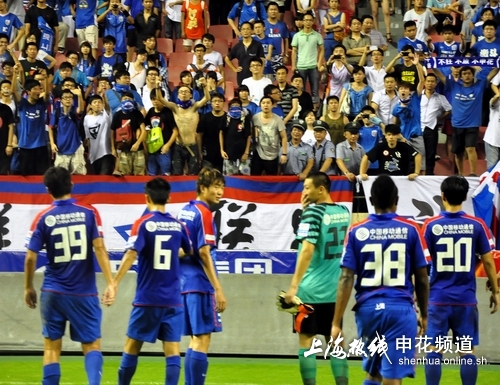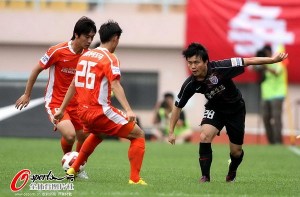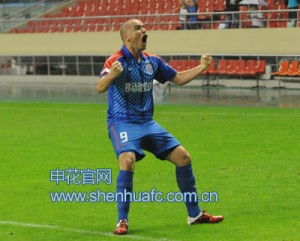Season 2011 is now well and truly over with the Chinese Super League concluded, the CFA cup won by Tianjin, and the national team out of the World Cup qualifers. In the first in a series of posts looking back over what was 2011 in Chinese football, assesess how the year went for Shanghai Shenhua.
Simply put, season 2011 was a bizarre and somewhat odd year for Shanghai Shenhua, and for the most part, it will go down as one of the club’s worst-ever campaigns. A record breaking winless streak over the summer and early autumn was bookended by a bright start to the season, and a magic last-minute victory over bitter rivals Beijing on the final day of the 2011 season. The China derby win was, incredibly, one of four victories Shenhua snatched with 90th minute goals, and even more remarkably, the other three also came against major rivals – Yangtze Delta Derby opponents Hangzhou and Jiangsu, and old foes Shandong. Frankly, if you had asked a Shenhua fan which four opponents you would like to see beaten with last minute victories, Beijing, Shandong, Hangzhou and Jiangsu would probably be the top four chosen by most.
However, aside from these four stunning wins, it was a season to forget.
Revolving door
As is usually the case, a shroud of unpredictability hung over Shenhua at the start of the season, with the revolving door at Hongkou spinning furiously as it has done in recent years, making any kind of continuity impossible. A new coach, Xi Zhikang, took the hotseat in place of Miroslav Blazevic, and a host of new foreign players joined the club. Season 2010’s golden boot winner Duvier Riascos was back though, as was last year’s Chinese Super League young player of the year, Feng Renliang. It was with these two stars in place that some Shenhua fans cautiously hoped the club would be able to mount a reasonable championship challenge – even if most agreed the championship itself would be beyond Shenuha’s grasp. At the start of the year, supporters’ expectations were largely modest: continuing the squad rebuilding efforts which began with Zhu Jun’s infamous fire sale of 2009, and qualifying for the ACL again.
And it was in the ACL that fans got their first glimpse of the team this year. With the Chinese Super League not starting until the very end of March, Shenhua kicked off their 2011 season with a dull 0-0 draw at home to J-League outfit Kashima Antlers. This game took place nearly a month before the Chinese Super League itself kicked off. Despite having played two competitive matches in the ACL, Shenhua contrived to lose a last minute goal to draw their opening Chinese Super League match 3-3 with Qingdao due to some very poor defending. It was to be a sign of things to come – last minute goals were again the order of the day as Shenhua were virtually knocked out of the ACL in April by Sydney. It was yet another poor continental campaign by Shenhua which left fans wondering why they had bothered entering in the first place. Their ACL involvement ended with one of the dullest games of football ever seen at Hongkou, a 3-0 defeat by Suwon Bluewings of South Korea.
Stunning derby victories
With the ACL out of the way, Shenhua put together a decent run of results in the first third of the season, including the first of the previously mentioned last-minute wins, a 1-0 victory against Shandong which saw Hongkou go absolutely nuts when Riascos netted the late winner. And if that was a thrilling end to a big match, it was nothing compared to THAT game – a magnificent contest which saw Shenhua come back from 2-0 down to win a Yangtze Delta Derby 3-2 against Jiangsu with a phenomenal last minute goal from Duvier Riascos. There was also an amusing game of “water ball” which saw Shenhua snatch a precious away victory in torrential rain away to Dalian.
By the 12th round, Shenhua were 3rd place behind big-spenders Guanghou, and old rivals Beijing. At this point in the season, most fans probably expected another 2 or 3rd placed finish to the season, as per usual. However, as we know now, things didn’t work out that way. The prolific Duvier Riascos, so often Shenhua’s talisman striker over the previous 18 months, decided not to renew his loan contract from his Columbian club side and returned to South America. His departure co-incided with a sudden change in Shenhua’s fortunes, as the club entered its customary annual downturn come July. Shenhua historically play so badly during the summer, that the Chinese football media have coined a term for it – 夏季综合征 (Xiaji zonghezheng) – Summer Syndrome.
The Summer Syndrome
In July, for the second consecutive year, Shenhua were beaten at home by basement side Nanchang. This started a record-breaking run where the club went nine games without a victory, losing all but one of these games, a 1-1 draw with Liaoning. The miserable sequence was finally halted with a 2-1 victory over Shaanxi in September, but there was more unpleasantness in store for Shenhua fans before the season was out, when the boys in blue suffered an embarassing 2-0 away defeat to Chengdu, a side which was eventually relegated. Shenhua flirted with relegation themselves towards the end of the season, hitting as low as 13th in the table, but they never seriously looked like getting relegated despite their shocking form, and two victories in their final three games, including yet another last-gasp win, this time against Beijing in the final match of the season, saw the Hongkou side finish 11th.
This was Shenhua’s worst season since 2004. That year, the club finished 10th out of 12 teams, just one point above the relegation zone, albeit it was the top league’s first season rebranded as the Chinese Super League and no clubs went down that year. They lost five games on the trot in 2004, a record they equalled this season during their nine-game winless run – despite their solid start to the season. This reversal of fortune left fans and neutral observers wondering how Shenhua managed to finish so far down the table after having been just five points off the lead with a third of the season gone.
Where did it all go wrong?
As previously discussed, there’s no doubt the mid-season departure of Riascos was a huge factor. Also, coach Xi Zhikang, who has something of a “firefighter” reputation was obviously never a permanent candidate for the job and therefore his powers to steady the side would have been limited by this. He made rather a lot of odd team selections, constantly playing players out of position, before being replaced by Drazen Besek in September. Disturbingly, Besek continued to make quite a few of the same odd decisions position-wise that Xi made, pointing to outside interference in team selection.
But on the field, a serious lack of leadership was evident – reflected in the fact that at least four different players wore the captain’s armband during the year – veteran Yu Tao, Wang Dalei, Dai Lin, and ‘s Shenhua player of the year, Cao Yunding. It’s unknown why such a captaincy-rotation policy was adpoted, its certainly not a wise one and did nothing to help the team break out of its terrible summer/autumn winless streak.
Personel-wise, Shenhua have the nucleus of a very good young squad and several young players really established themselves this year. Jiang Jiajun, Qiu Tianyi, Wu Xi and Cao Yunding all had good seasons. Wang Dalei seems to have been around for ages but is still only 22 and his best years are ahead of him. Feng Renliang had a dissapointing second season after bursting onto the scene this year, but he did establish himself in the national squad. If Shenhua can hold onto all these players next season, then they can realistically aim for an ACL place.
Shenhua will need to get hold of better foreign players however. Whilst Salmeron was a big hit and Angulo a good signing, Castro was a waste of a foreign player slot. He did absolutely nothing in midfield which a Chinese player couldn’t have done. Similarly, upfront, Eisner Iván Loboa was signed to replace Riascos. He was also black, Columbian, and of slight build, but the similarities ended there and he did not make any significant impact. He started six games and came off the bench eight times, but scored only once.
Looking ahead
Overall, a difficult season to sum up, owing to the aforementioned spectacular victories contrasting with a terrible winless run. However there’s no other way to describe the year other than as a huge dissapointment. Shanghai football is currently at its lowest ebb – crowds barely hitting five figures at Hongkou, a lowest league finish in years, the club seriously lacking finance, and their last championship, in 2003, seeming more and more like a distant memory.
The picture for next year seems very uncertain, talk of signing Nicholas Anelka seems like pie in the sky considering the club has little money. Shanghai’s bureau of sport is rumoured to be injecting cash into the club, but it’s unlikely to be anywhere near the riches lavished by Guangzhou. However, Shenhua has a young and promising squad, if they can retain this nucleus, and get a top coach who stays for more than one season, followed by some shrewd foreign signings, the team could easily be back to its former glory as one of China’s dominant clubs within the next couple of seasons.







There were many times that i felt so gutted and helpless on the metro train back home after the game,because we only had one striker who doesnt seem to have any pace ,and due to injuries and suspensions,our team selection was so predictable that ruled out any tatical surprises.But I think it was more down to the horrible management of the board than the players or manegers,once the players had their confidence back ,the team is back to normal.
Another point i’d like to raise is Xi Zhikang,to be honest,I dont think he’s the REAL maneger,Since ChengLiang is manoeuvring things at the back during most of the CSL Seanson until Bersek came in.Since Xi is Shenhua through and through(He is a Gerrard type of player who scored a goal against West Brom back in the late 70’s)I do feel sorry for him.
If you studied the history of shenhua under Zhu Jun,you will find the team usually play one good year and one bad year.Since we already had a terrible year,and with things looking very promsing at the moemnt,I just hope next year will be a good year for us,fingers crossed.
Yeah Bobby, I think you are right, Shenhua never seem to have two good seasons in a row, but next year its hard to predict, a lot of teams are going to spend big to try to catch up with Guangzhou, but, I am not sure Shenhua are going to be spending as much as everyone else. Certainly though, next year can’t be as bad as this year.
Nice, objective roundup, somehow looking at “what went wrong” without being halfway as libelous as the pub talks regularly get!
You’ve hit the nail on the head regarding on-field leadership: while the squad is overall thin and lop-sided, there’s definite potential in a lot of the younger lads. Holding onto Salmeron and bringing in a cooler head to lead the back line and a bit of steel in midfield would go a long way toward making me feel as optimistic about next year as you do!
Actually Steve, Shenhua were a bit unlucky in someways to finish so low down the league. Their squad had the potential to finish in the top four even without Riascos, but due to the problems I highlight, they went on a bad run and couldn’t get back on the rails. Next year I’d expect them to finish in the top six, but they won’t win the championship without some seirous money going into the playing squad.